Foundation Year Project: Future Sustainability in UK Business
VerifiedAdded on 2023/06/15
|11
|2078
|327
Project
AI Summary
This foundation year project investigates sustainability practices within the UK business and tourism industries, using TUI (Touristik Union International) as a case study. The research aims to determine the importance of sustainability, identify methods for maintaining it, and examine its benefits for TUI. The study employs qualitative research methods and secondary data analysis, including a systematic literature review. Findings highlight the increasing pressure on the environment due to tourism growth and the importance of adopting green technologies and sustainable practices. The project concludes that sustainability is crucial for travel companies to reduce waste, improve brand image, and protect the environment, ultimately leading to increased profitability and a positive impact on the natural ecosystem.
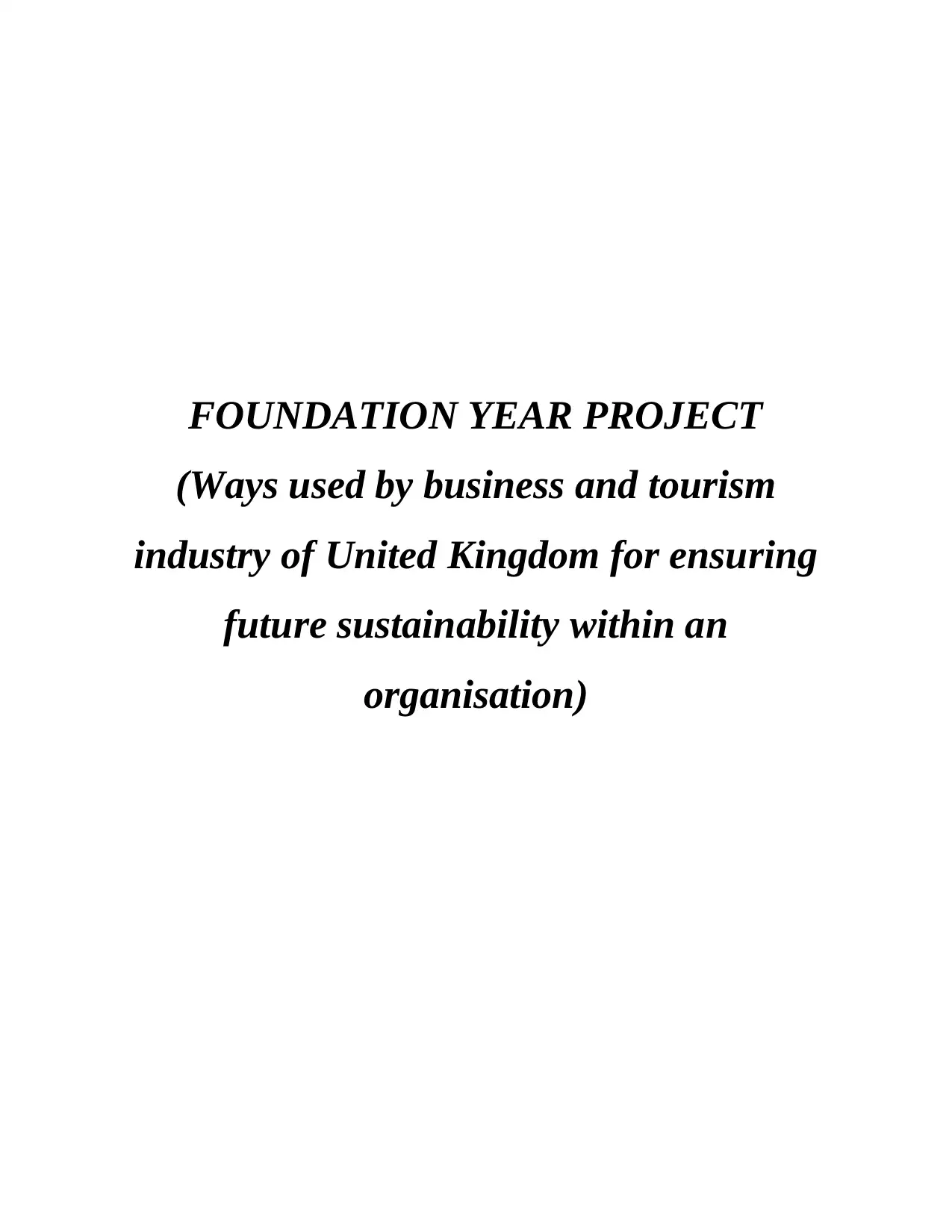
FOUNDATION YEAR PROJECT
(Ways used by business and tourism
industry of United Kingdom for ensuring
future sustainability within an
organisation)
(Ways used by business and tourism
industry of United Kingdom for ensuring
future sustainability within an
organisation)
Paraphrase This Document
Need a fresh take? Get an instant paraphrase of this document with our AI Paraphraser
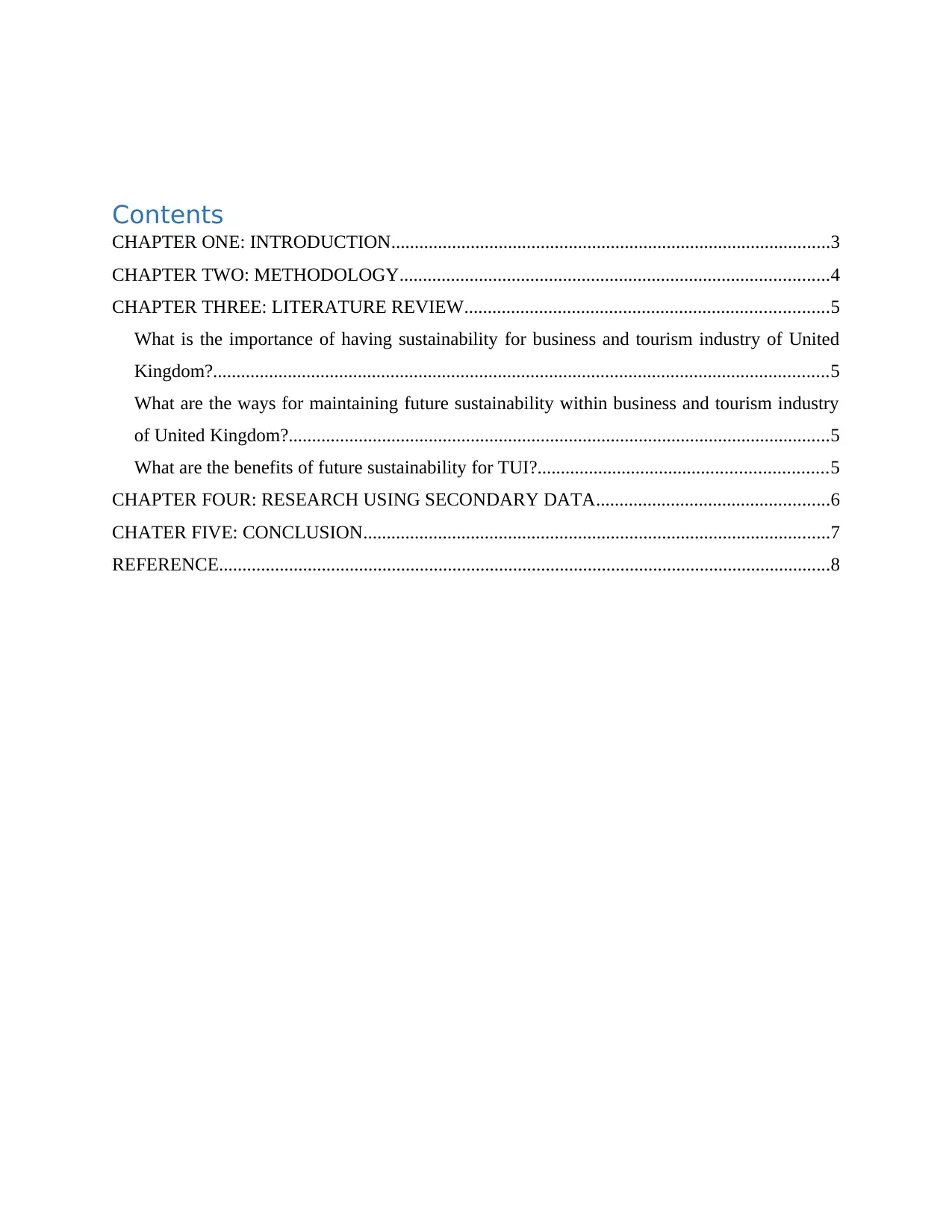
Contents
CHAPTER ONE: INTRODUCTION..............................................................................................3
CHAPTER TWO: METHODOLOGY............................................................................................4
CHAPTER THREE: LITERATURE REVIEW..............................................................................5
What is the importance of having sustainability for business and tourism industry of United
Kingdom?....................................................................................................................................5
What are the ways for maintaining future sustainability within business and tourism industry
of United Kingdom?....................................................................................................................5
What are the benefits of future sustainability for TUI?..............................................................5
CHAPTER FOUR: RESEARCH USING SECONDARY DATA..................................................6
CHATER FIVE: CONCLUSION....................................................................................................7
REFERENCE...................................................................................................................................8
CHAPTER ONE: INTRODUCTION..............................................................................................3
CHAPTER TWO: METHODOLOGY............................................................................................4
CHAPTER THREE: LITERATURE REVIEW..............................................................................5
What is the importance of having sustainability for business and tourism industry of United
Kingdom?....................................................................................................................................5
What are the ways for maintaining future sustainability within business and tourism industry
of United Kingdom?....................................................................................................................5
What are the benefits of future sustainability for TUI?..............................................................5
CHAPTER FOUR: RESEARCH USING SECONDARY DATA..................................................6
CHATER FIVE: CONCLUSION....................................................................................................7
REFERENCE...................................................................................................................................8
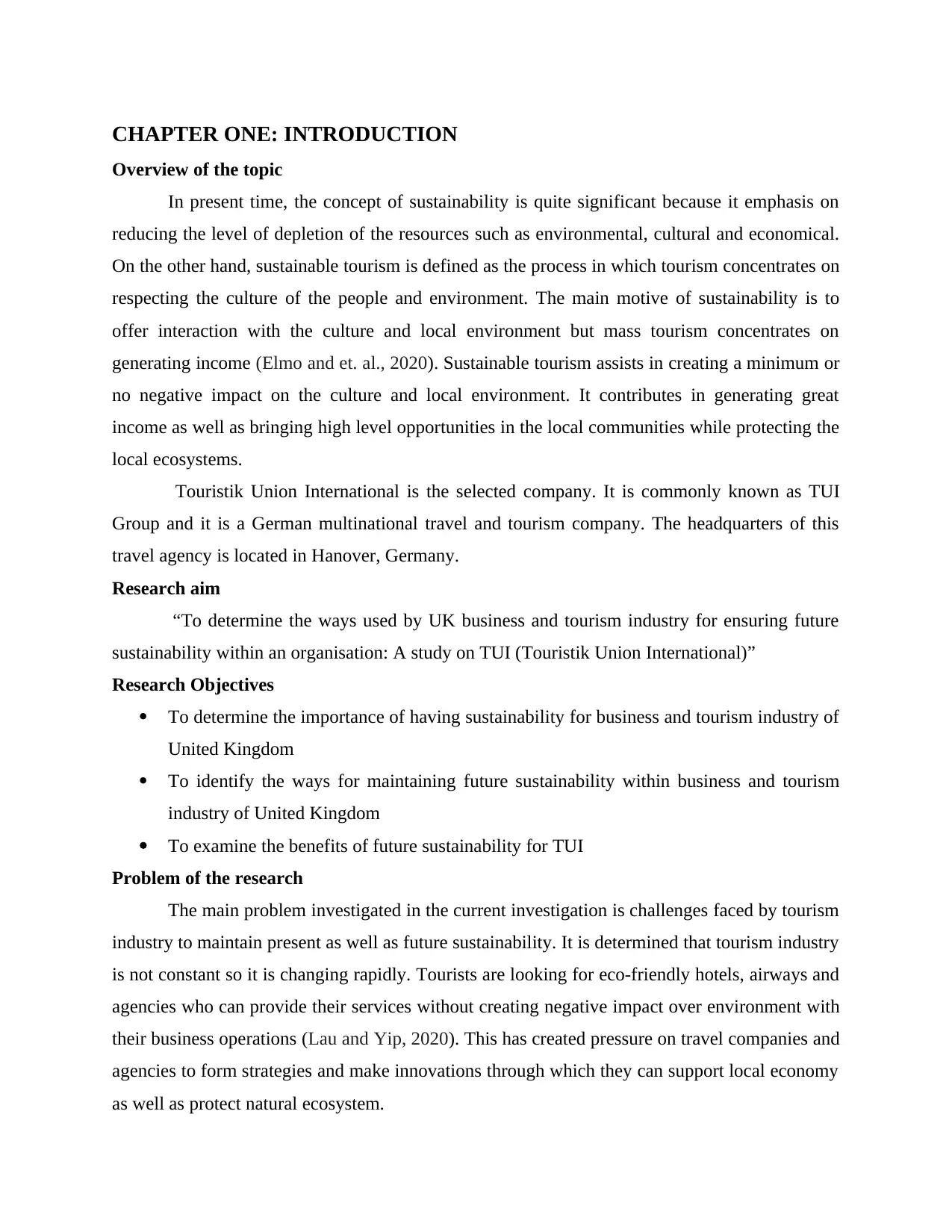
CHAPTER ONE: INTRODUCTION
Overview of the topic
In present time, the concept of sustainability is quite significant because it emphasis on
reducing the level of depletion of the resources such as environmental, cultural and economical.
On the other hand, sustainable tourism is defined as the process in which tourism concentrates on
respecting the culture of the people and environment. The main motive of sustainability is to
offer interaction with the culture and local environment but mass tourism concentrates on
generating income (Elmo and et. al., 2020). Sustainable tourism assists in creating a minimum or
no negative impact on the culture and local environment. It contributes in generating great
income as well as bringing high level opportunities in the local communities while protecting the
local ecosystems.
Touristik Union International is the selected company. It is commonly known as TUI
Group and it is a German multinational travel and tourism company. The headquarters of this
travel agency is located in Hanover, Germany.
Research aim
“To determine the ways used by UK business and tourism industry for ensuring future
sustainability within an organisation: A study on TUI (Touristik Union International)”
Research Objectives
To determine the importance of having sustainability for business and tourism industry of
United Kingdom
To identify the ways for maintaining future sustainability within business and tourism
industry of United Kingdom
To examine the benefits of future sustainability for TUI
Problem of the research
The main problem investigated in the current investigation is challenges faced by tourism
industry to maintain present as well as future sustainability. It is determined that tourism industry
is not constant so it is changing rapidly. Tourists are looking for eco-friendly hotels, airways and
agencies who can provide their services without creating negative impact over environment with
their business operations (Lau and Yip, 2020). This has created pressure on travel companies and
agencies to form strategies and make innovations through which they can support local economy
as well as protect natural ecosystem.
Overview of the topic
In present time, the concept of sustainability is quite significant because it emphasis on
reducing the level of depletion of the resources such as environmental, cultural and economical.
On the other hand, sustainable tourism is defined as the process in which tourism concentrates on
respecting the culture of the people and environment. The main motive of sustainability is to
offer interaction with the culture and local environment but mass tourism concentrates on
generating income (Elmo and et. al., 2020). Sustainable tourism assists in creating a minimum or
no negative impact on the culture and local environment. It contributes in generating great
income as well as bringing high level opportunities in the local communities while protecting the
local ecosystems.
Touristik Union International is the selected company. It is commonly known as TUI
Group and it is a German multinational travel and tourism company. The headquarters of this
travel agency is located in Hanover, Germany.
Research aim
“To determine the ways used by UK business and tourism industry for ensuring future
sustainability within an organisation: A study on TUI (Touristik Union International)”
Research Objectives
To determine the importance of having sustainability for business and tourism industry of
United Kingdom
To identify the ways for maintaining future sustainability within business and tourism
industry of United Kingdom
To examine the benefits of future sustainability for TUI
Problem of the research
The main problem investigated in the current investigation is challenges faced by tourism
industry to maintain present as well as future sustainability. It is determined that tourism industry
is not constant so it is changing rapidly. Tourists are looking for eco-friendly hotels, airways and
agencies who can provide their services without creating negative impact over environment with
their business operations (Lau and Yip, 2020). This has created pressure on travel companies and
agencies to form strategies and make innovations through which they can support local economy
as well as protect natural ecosystem.
⊘ This is a preview!⊘
Do you want full access?
Subscribe today to unlock all pages.

Trusted by 1+ million students worldwide
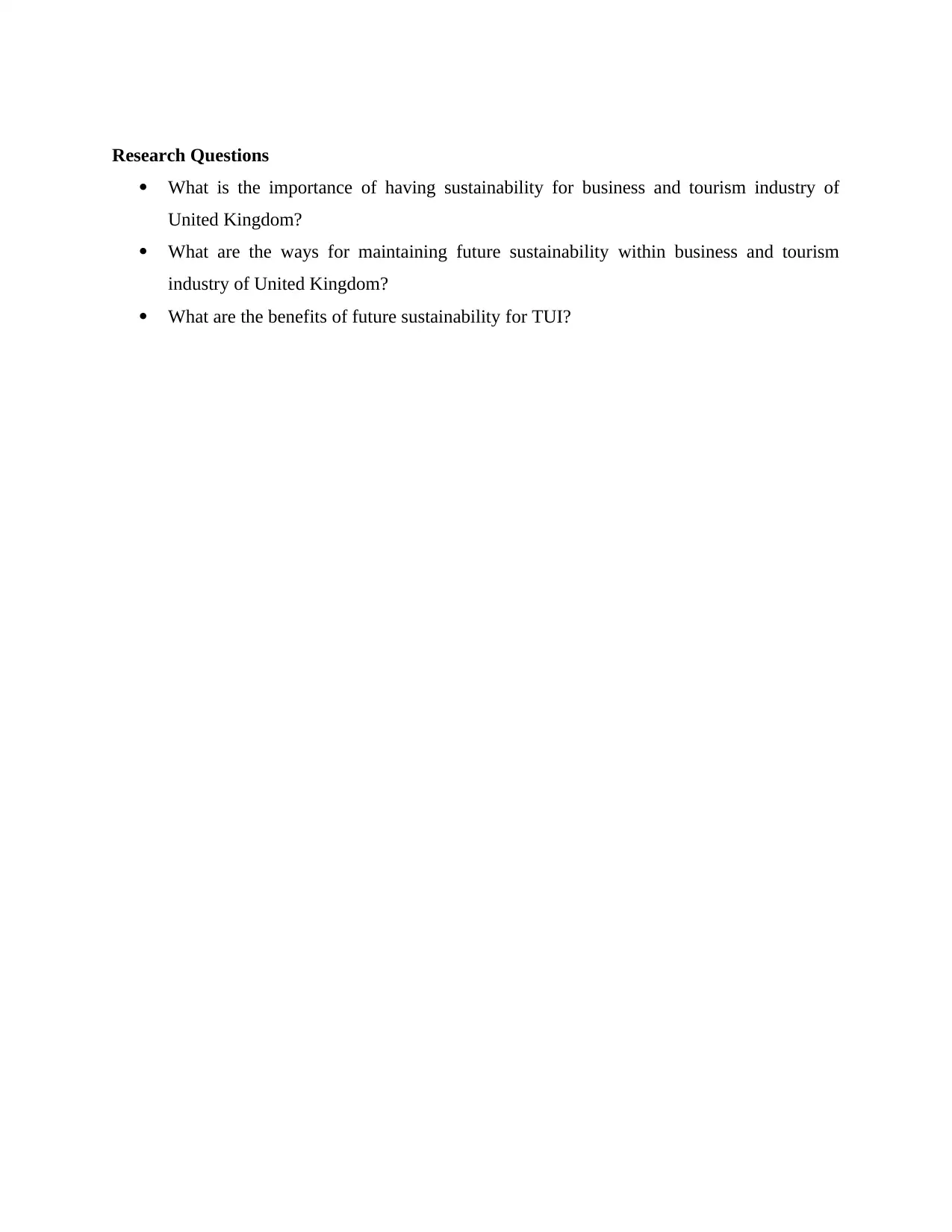
Research Questions
What is the importance of having sustainability for business and tourism industry of
United Kingdom?
What are the ways for maintaining future sustainability within business and tourism
industry of United Kingdom?
What are the benefits of future sustainability for TUI?
What is the importance of having sustainability for business and tourism industry of
United Kingdom?
What are the ways for maintaining future sustainability within business and tourism
industry of United Kingdom?
What are the benefits of future sustainability for TUI?
Paraphrase This Document
Need a fresh take? Get an instant paraphrase of this document with our AI Paraphraser
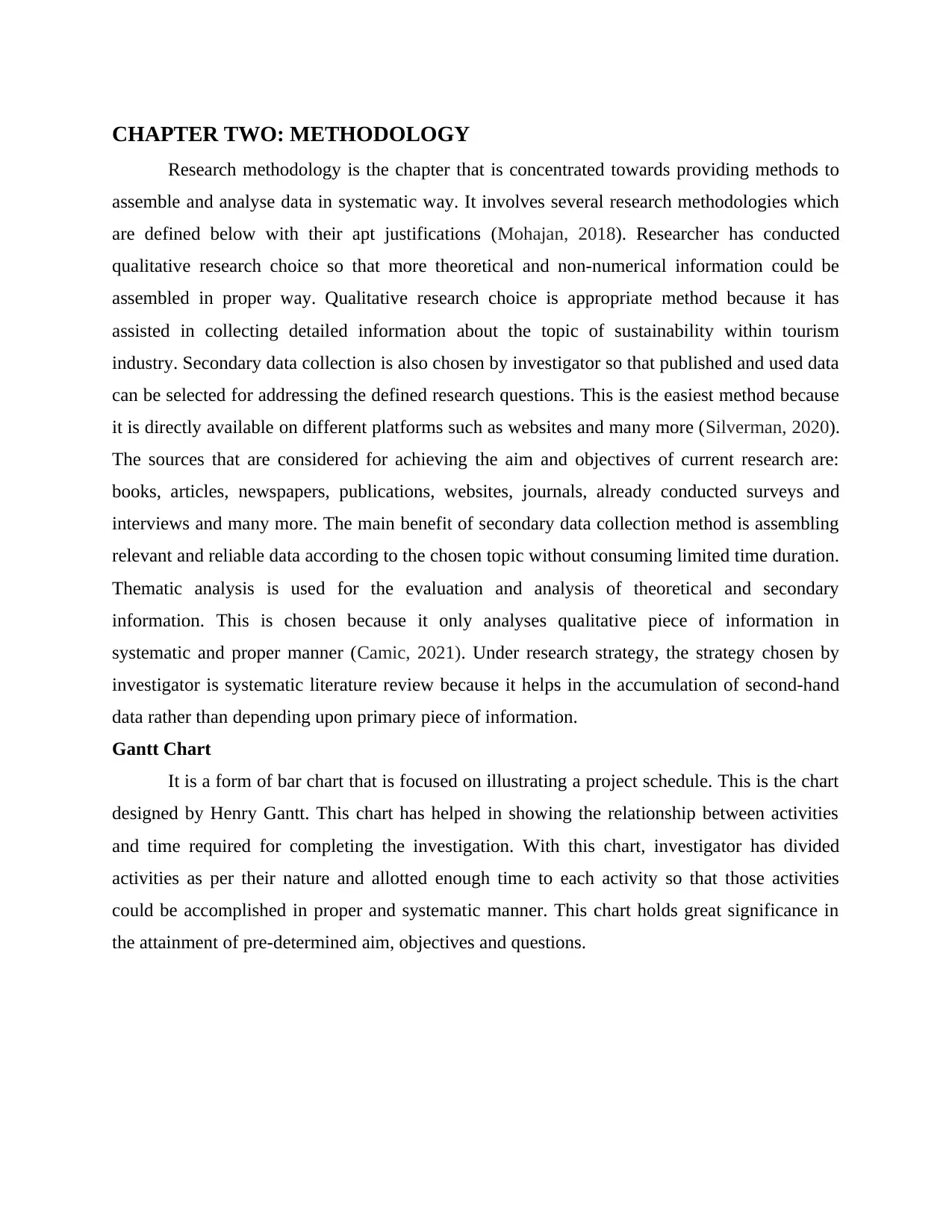
CHAPTER TWO: METHODOLOGY
Research methodology is the chapter that is concentrated towards providing methods to
assemble and analyse data in systematic way. It involves several research methodologies which
are defined below with their apt justifications (Mohajan, 2018). Researcher has conducted
qualitative research choice so that more theoretical and non-numerical information could be
assembled in proper way. Qualitative research choice is appropriate method because it has
assisted in collecting detailed information about the topic of sustainability within tourism
industry. Secondary data collection is also chosen by investigator so that published and used data
can be selected for addressing the defined research questions. This is the easiest method because
it is directly available on different platforms such as websites and many more (Silverman, 2020).
The sources that are considered for achieving the aim and objectives of current research are:
books, articles, newspapers, publications, websites, journals, already conducted surveys and
interviews and many more. The main benefit of secondary data collection method is assembling
relevant and reliable data according to the chosen topic without consuming limited time duration.
Thematic analysis is used for the evaluation and analysis of theoretical and secondary
information. This is chosen because it only analyses qualitative piece of information in
systematic and proper manner (Camic, 2021). Under research strategy, the strategy chosen by
investigator is systematic literature review because it helps in the accumulation of second-hand
data rather than depending upon primary piece of information.
Gantt Chart
It is a form of bar chart that is focused on illustrating a project schedule. This is the chart
designed by Henry Gantt. This chart has helped in showing the relationship between activities
and time required for completing the investigation. With this chart, investigator has divided
activities as per their nature and allotted enough time to each activity so that those activities
could be accomplished in proper and systematic manner. This chart holds great significance in
the attainment of pre-determined aim, objectives and questions.
Research methodology is the chapter that is concentrated towards providing methods to
assemble and analyse data in systematic way. It involves several research methodologies which
are defined below with their apt justifications (Mohajan, 2018). Researcher has conducted
qualitative research choice so that more theoretical and non-numerical information could be
assembled in proper way. Qualitative research choice is appropriate method because it has
assisted in collecting detailed information about the topic of sustainability within tourism
industry. Secondary data collection is also chosen by investigator so that published and used data
can be selected for addressing the defined research questions. This is the easiest method because
it is directly available on different platforms such as websites and many more (Silverman, 2020).
The sources that are considered for achieving the aim and objectives of current research are:
books, articles, newspapers, publications, websites, journals, already conducted surveys and
interviews and many more. The main benefit of secondary data collection method is assembling
relevant and reliable data according to the chosen topic without consuming limited time duration.
Thematic analysis is used for the evaluation and analysis of theoretical and secondary
information. This is chosen because it only analyses qualitative piece of information in
systematic and proper manner (Camic, 2021). Under research strategy, the strategy chosen by
investigator is systematic literature review because it helps in the accumulation of second-hand
data rather than depending upon primary piece of information.
Gantt Chart
It is a form of bar chart that is focused on illustrating a project schedule. This is the chart
designed by Henry Gantt. This chart has helped in showing the relationship between activities
and time required for completing the investigation. With this chart, investigator has divided
activities as per their nature and allotted enough time to each activity so that those activities
could be accomplished in proper and systematic manner. This chart holds great significance in
the attainment of pre-determined aim, objectives and questions.
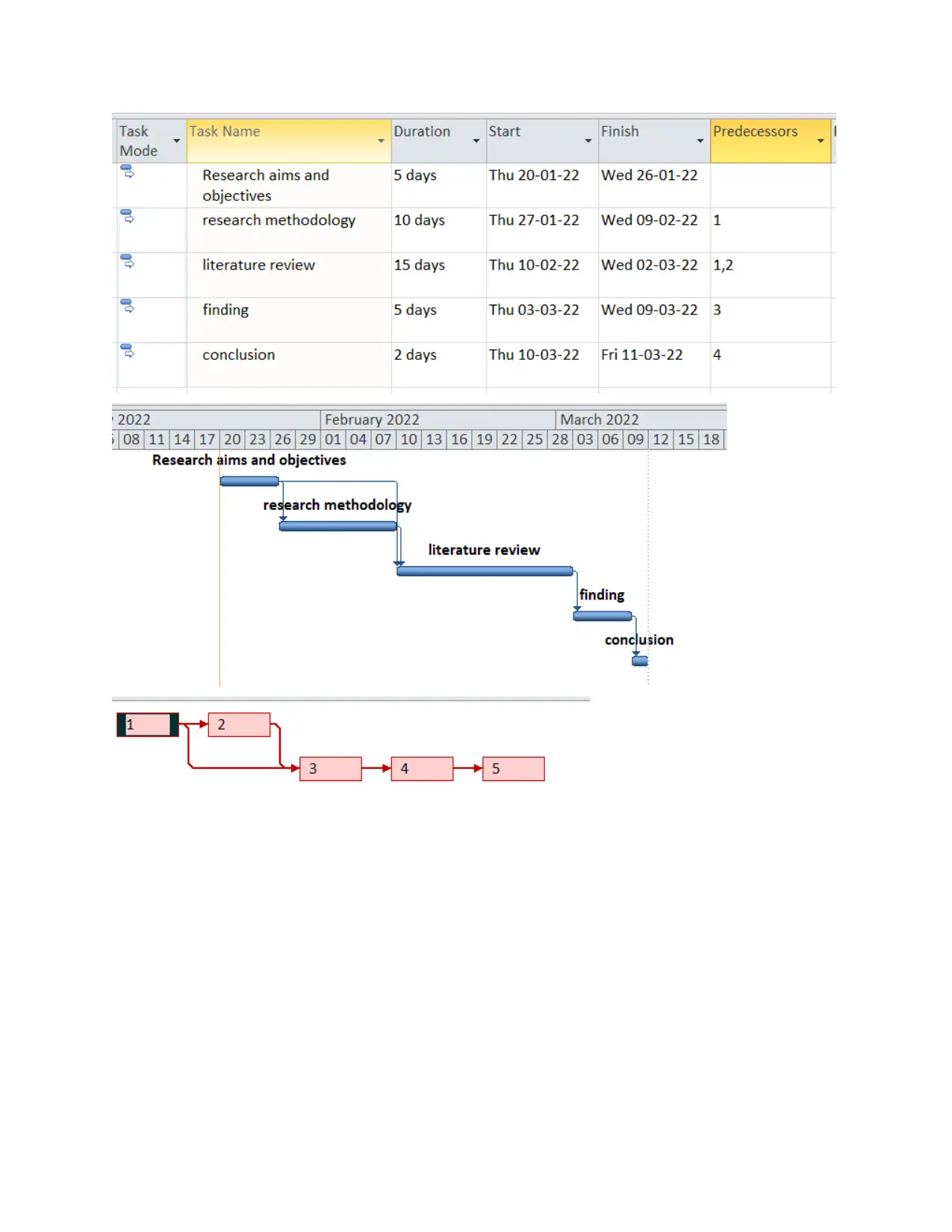
⊘ This is a preview!⊘
Do you want full access?
Subscribe today to unlock all pages.

Trusted by 1+ million students worldwide
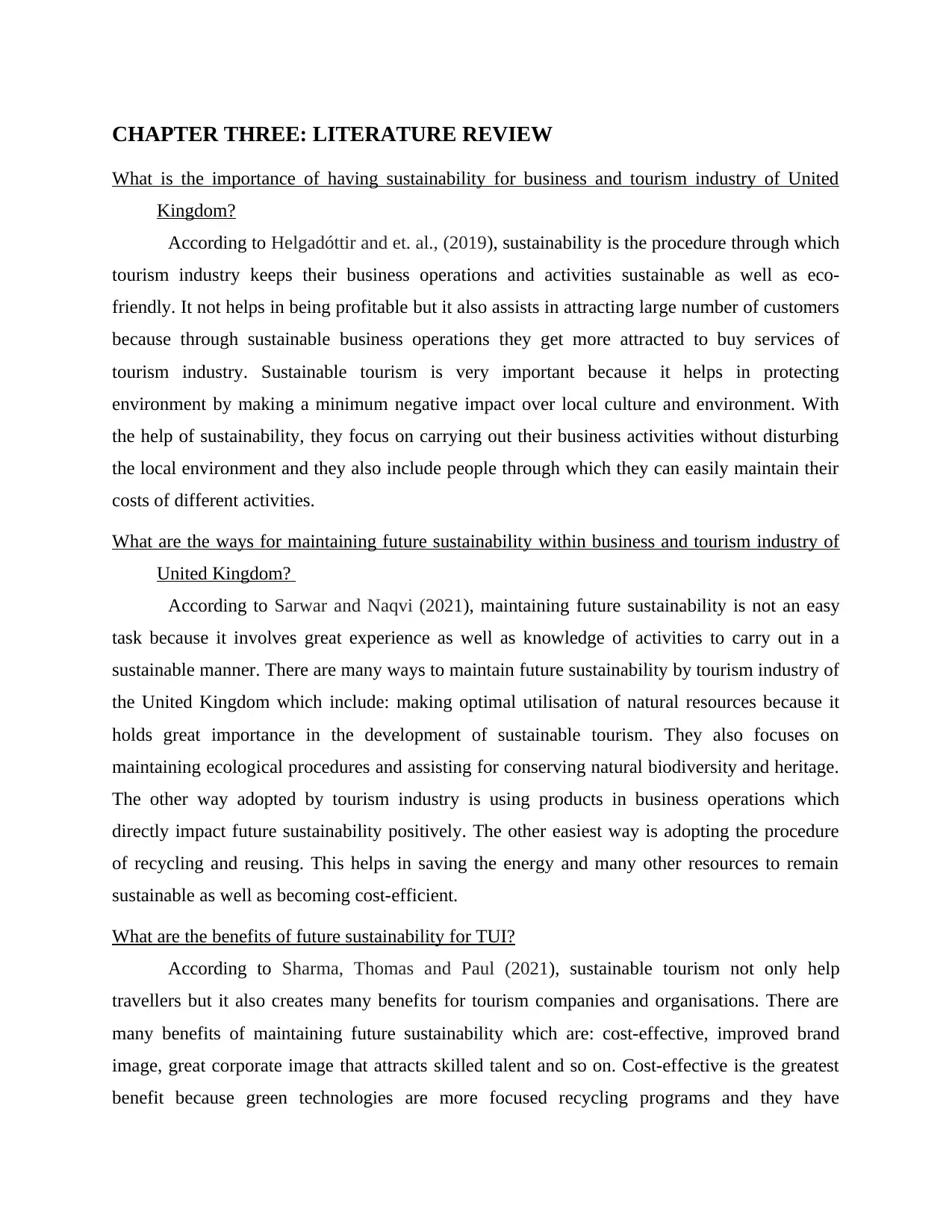
CHAPTER THREE: LITERATURE REVIEW
What is the importance of having sustainability for business and tourism industry of United
Kingdom?
According to Helgadóttir and et. al., (2019), sustainability is the procedure through which
tourism industry keeps their business operations and activities sustainable as well as eco-
friendly. It not helps in being profitable but it also assists in attracting large number of customers
because through sustainable business operations they get more attracted to buy services of
tourism industry. Sustainable tourism is very important because it helps in protecting
environment by making a minimum negative impact over local culture and environment. With
the help of sustainability, they focus on carrying out their business activities without disturbing
the local environment and they also include people through which they can easily maintain their
costs of different activities.
What are the ways for maintaining future sustainability within business and tourism industry of
United Kingdom?
According to Sarwar and Naqvi (2021), maintaining future sustainability is not an easy
task because it involves great experience as well as knowledge of activities to carry out in a
sustainable manner. There are many ways to maintain future sustainability by tourism industry of
the United Kingdom which include: making optimal utilisation of natural resources because it
holds great importance in the development of sustainable tourism. They also focuses on
maintaining ecological procedures and assisting for conserving natural biodiversity and heritage.
The other way adopted by tourism industry is using products in business operations which
directly impact future sustainability positively. The other easiest way is adopting the procedure
of recycling and reusing. This helps in saving the energy and many other resources to remain
sustainable as well as becoming cost-efficient.
What are the benefits of future sustainability for TUI?
According to Sharma, Thomas and Paul (2021), sustainable tourism not only help
travellers but it also creates many benefits for tourism companies and organisations. There are
many benefits of maintaining future sustainability which are: cost-effective, improved brand
image, great corporate image that attracts skilled talent and so on. Cost-effective is the greatest
benefit because green technologies are more focused recycling programs and they have
What is the importance of having sustainability for business and tourism industry of United
Kingdom?
According to Helgadóttir and et. al., (2019), sustainability is the procedure through which
tourism industry keeps their business operations and activities sustainable as well as eco-
friendly. It not helps in being profitable but it also assists in attracting large number of customers
because through sustainable business operations they get more attracted to buy services of
tourism industry. Sustainable tourism is very important because it helps in protecting
environment by making a minimum negative impact over local culture and environment. With
the help of sustainability, they focus on carrying out their business activities without disturbing
the local environment and they also include people through which they can easily maintain their
costs of different activities.
What are the ways for maintaining future sustainability within business and tourism industry of
United Kingdom?
According to Sarwar and Naqvi (2021), maintaining future sustainability is not an easy
task because it involves great experience as well as knowledge of activities to carry out in a
sustainable manner. There are many ways to maintain future sustainability by tourism industry of
the United Kingdom which include: making optimal utilisation of natural resources because it
holds great importance in the development of sustainable tourism. They also focuses on
maintaining ecological procedures and assisting for conserving natural biodiversity and heritage.
The other way adopted by tourism industry is using products in business operations which
directly impact future sustainability positively. The other easiest way is adopting the procedure
of recycling and reusing. This helps in saving the energy and many other resources to remain
sustainable as well as becoming cost-efficient.
What are the benefits of future sustainability for TUI?
According to Sharma, Thomas and Paul (2021), sustainable tourism not only help
travellers but it also creates many benefits for tourism companies and organisations. There are
many benefits of maintaining future sustainability which are: cost-effective, improved brand
image, great corporate image that attracts skilled talent and so on. Cost-effective is the greatest
benefit because green technologies are more focused recycling programs and they have
Paraphrase This Document
Need a fresh take? Get an instant paraphrase of this document with our AI Paraphraser
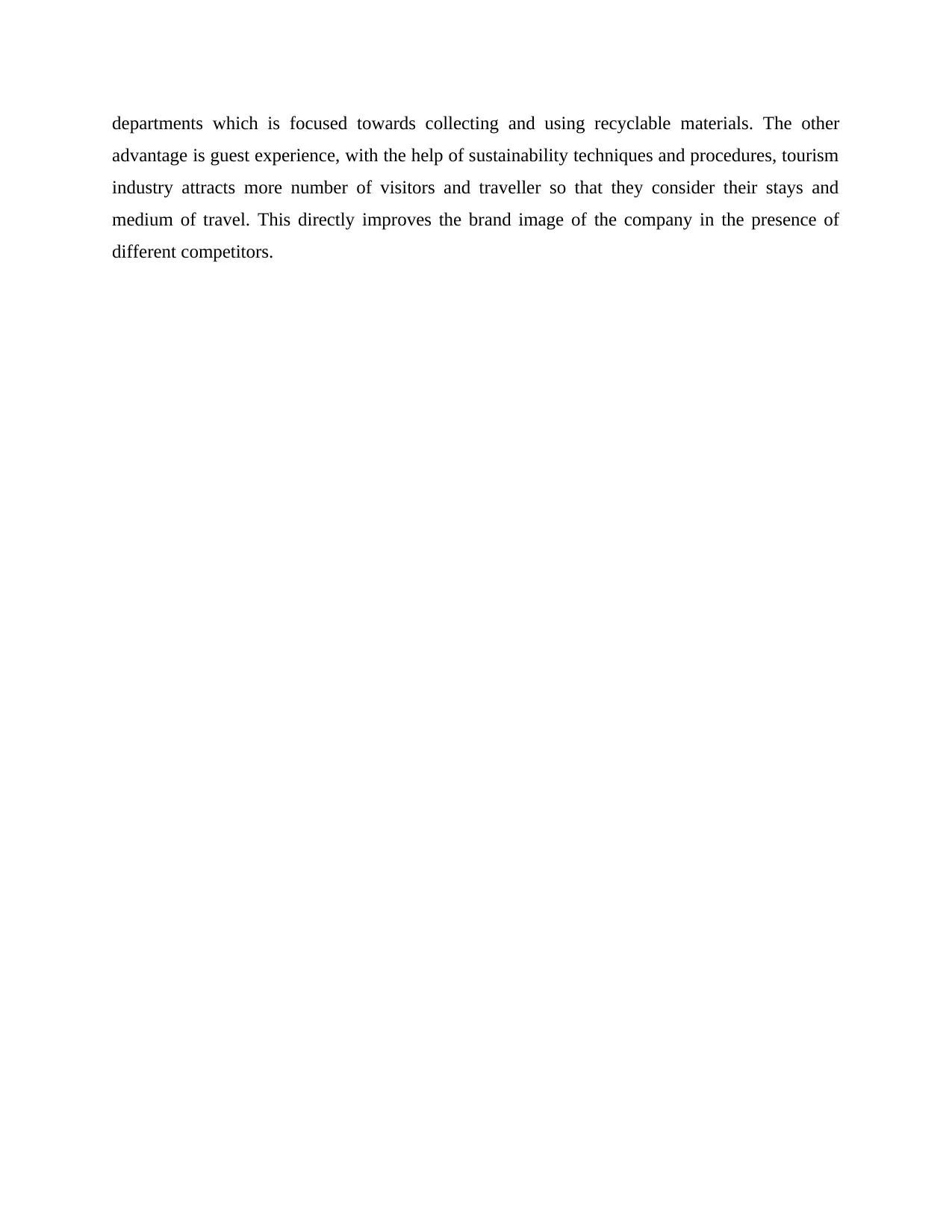
departments which is focused towards collecting and using recyclable materials. The other
advantage is guest experience, with the help of sustainability techniques and procedures, tourism
industry attracts more number of visitors and traveller so that they consider their stays and
medium of travel. This directly improves the brand image of the company in the presence of
different competitors.
advantage is guest experience, with the help of sustainability techniques and procedures, tourism
industry attracts more number of visitors and traveller so that they consider their stays and
medium of travel. This directly improves the brand image of the company in the presence of
different competitors.
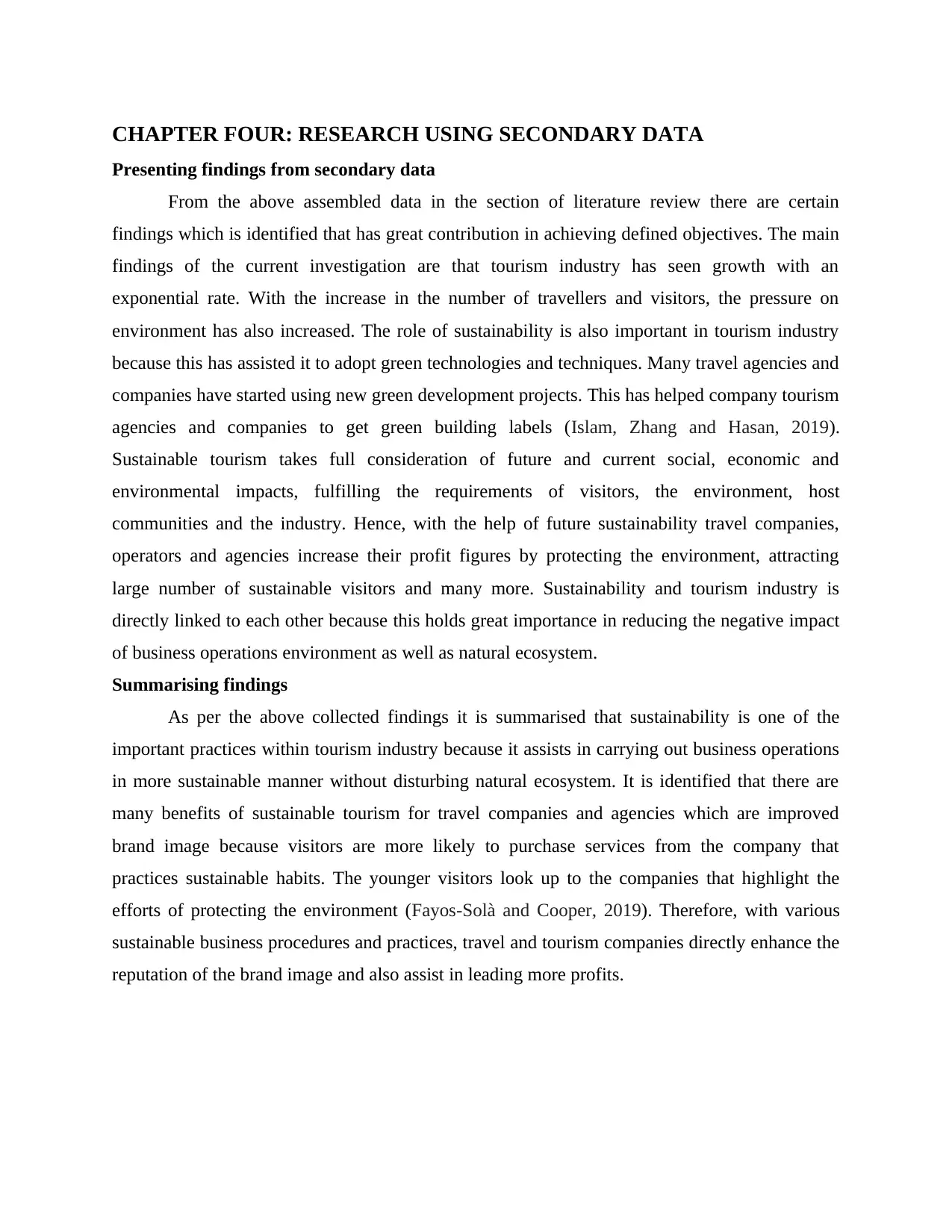
CHAPTER FOUR: RESEARCH USING SECONDARY DATA
Presenting findings from secondary data
From the above assembled data in the section of literature review there are certain
findings which is identified that has great contribution in achieving defined objectives. The main
findings of the current investigation are that tourism industry has seen growth with an
exponential rate. With the increase in the number of travellers and visitors, the pressure on
environment has also increased. The role of sustainability is also important in tourism industry
because this has assisted it to adopt green technologies and techniques. Many travel agencies and
companies have started using new green development projects. This has helped company tourism
agencies and companies to get green building labels (Islam, Zhang and Hasan, 2019).
Sustainable tourism takes full consideration of future and current social, economic and
environmental impacts, fulfilling the requirements of visitors, the environment, host
communities and the industry. Hence, with the help of future sustainability travel companies,
operators and agencies increase their profit figures by protecting the environment, attracting
large number of sustainable visitors and many more. Sustainability and tourism industry is
directly linked to each other because this holds great importance in reducing the negative impact
of business operations environment as well as natural ecosystem.
Summarising findings
As per the above collected findings it is summarised that sustainability is one of the
important practices within tourism industry because it assists in carrying out business operations
in more sustainable manner without disturbing natural ecosystem. It is identified that there are
many benefits of sustainable tourism for travel companies and agencies which are improved
brand image because visitors are more likely to purchase services from the company that
practices sustainable habits. The younger visitors look up to the companies that highlight the
efforts of protecting the environment (Fayos-Solà and Cooper, 2019). Therefore, with various
sustainable business procedures and practices, travel and tourism companies directly enhance the
reputation of the brand image and also assist in leading more profits.
Presenting findings from secondary data
From the above assembled data in the section of literature review there are certain
findings which is identified that has great contribution in achieving defined objectives. The main
findings of the current investigation are that tourism industry has seen growth with an
exponential rate. With the increase in the number of travellers and visitors, the pressure on
environment has also increased. The role of sustainability is also important in tourism industry
because this has assisted it to adopt green technologies and techniques. Many travel agencies and
companies have started using new green development projects. This has helped company tourism
agencies and companies to get green building labels (Islam, Zhang and Hasan, 2019).
Sustainable tourism takes full consideration of future and current social, economic and
environmental impacts, fulfilling the requirements of visitors, the environment, host
communities and the industry. Hence, with the help of future sustainability travel companies,
operators and agencies increase their profit figures by protecting the environment, attracting
large number of sustainable visitors and many more. Sustainability and tourism industry is
directly linked to each other because this holds great importance in reducing the negative impact
of business operations environment as well as natural ecosystem.
Summarising findings
As per the above collected findings it is summarised that sustainability is one of the
important practices within tourism industry because it assists in carrying out business operations
in more sustainable manner without disturbing natural ecosystem. It is identified that there are
many benefits of sustainable tourism for travel companies and agencies which are improved
brand image because visitors are more likely to purchase services from the company that
practices sustainable habits. The younger visitors look up to the companies that highlight the
efforts of protecting the environment (Fayos-Solà and Cooper, 2019). Therefore, with various
sustainable business procedures and practices, travel and tourism companies directly enhance the
reputation of the brand image and also assist in leading more profits.
⊘ This is a preview!⊘
Do you want full access?
Subscribe today to unlock all pages.

Trusted by 1+ million students worldwide
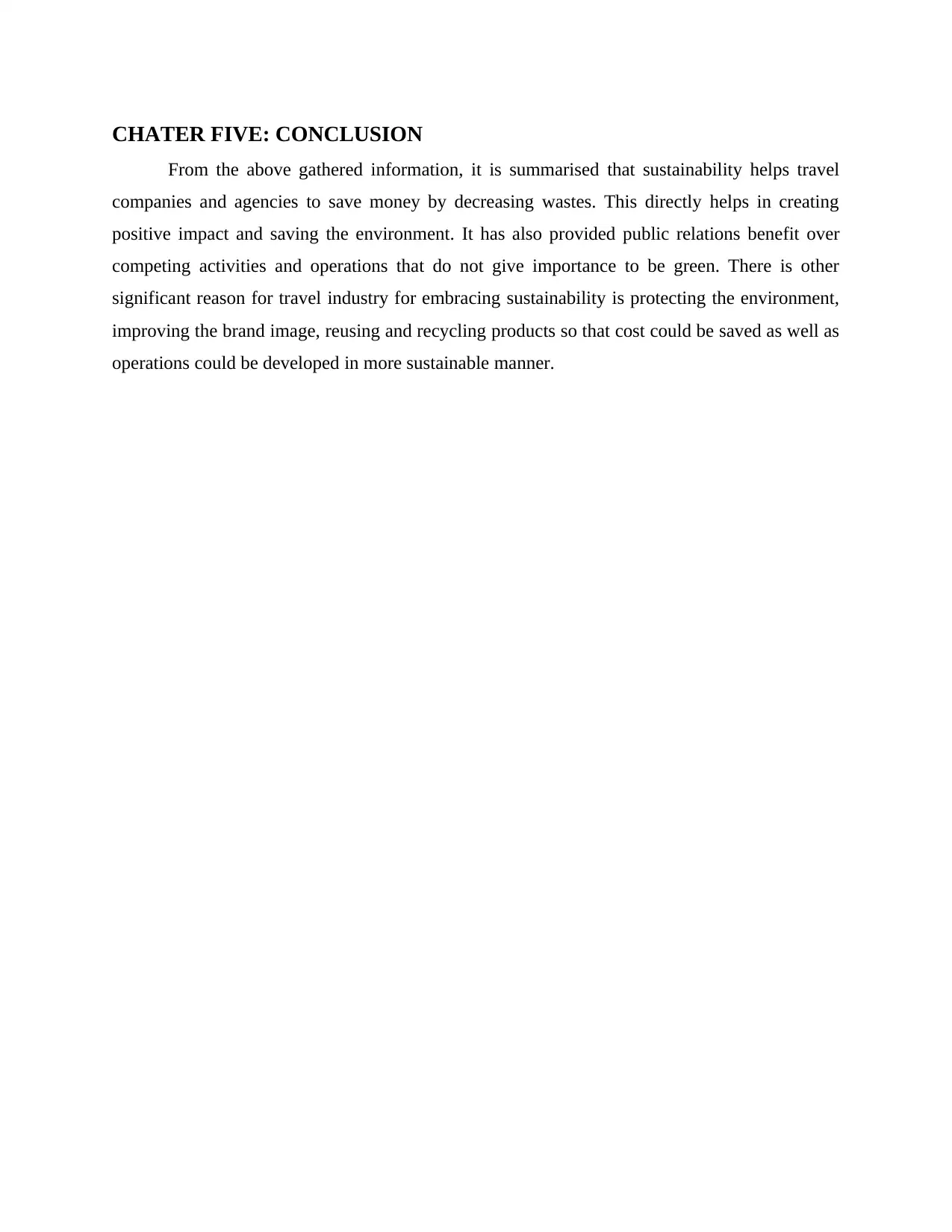
CHATER FIVE: CONCLUSION
From the above gathered information, it is summarised that sustainability helps travel
companies and agencies to save money by decreasing wastes. This directly helps in creating
positive impact and saving the environment. It has also provided public relations benefit over
competing activities and operations that do not give importance to be green. There is other
significant reason for travel industry for embracing sustainability is protecting the environment,
improving the brand image, reusing and recycling products so that cost could be saved as well as
operations could be developed in more sustainable manner.
From the above gathered information, it is summarised that sustainability helps travel
companies and agencies to save money by decreasing wastes. This directly helps in creating
positive impact and saving the environment. It has also provided public relations benefit over
competing activities and operations that do not give importance to be green. There is other
significant reason for travel industry for embracing sustainability is protecting the environment,
improving the brand image, reusing and recycling products so that cost could be saved as well as
operations could be developed in more sustainable manner.
Paraphrase This Document
Need a fresh take? Get an instant paraphrase of this document with our AI Paraphraser
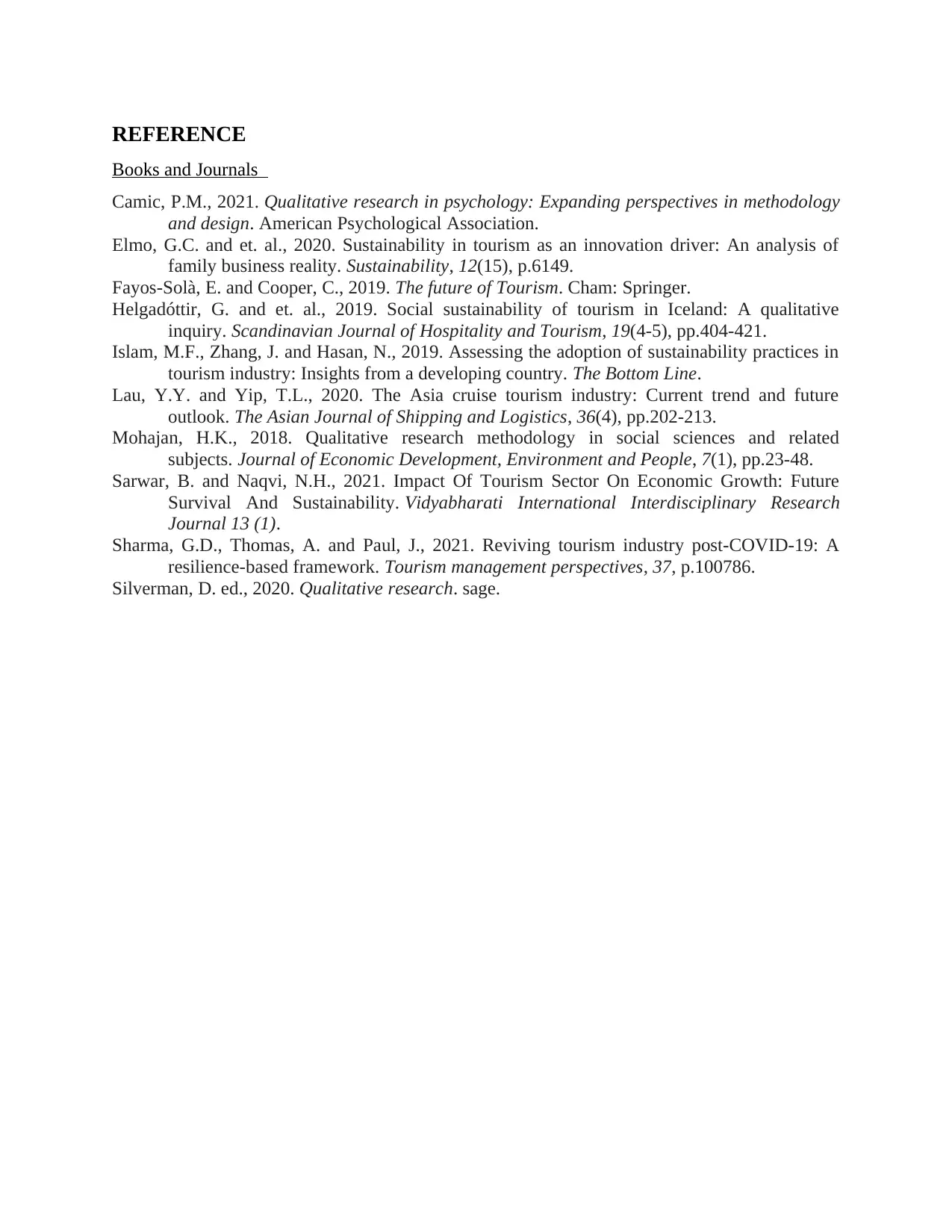
REFERENCE
Books and Journals
Camic, P.M., 2021. Qualitative research in psychology: Expanding perspectives in methodology
and design. American Psychological Association.
Elmo, G.C. and et. al., 2020. Sustainability in tourism as an innovation driver: An analysis of
family business reality. Sustainability, 12(15), p.6149.
Fayos-Solà, E. and Cooper, C., 2019. The future of Tourism. Cham: Springer.
Helgadóttir, G. and et. al., 2019. Social sustainability of tourism in Iceland: A qualitative
inquiry. Scandinavian Journal of Hospitality and Tourism, 19(4-5), pp.404-421.
Islam, M.F., Zhang, J. and Hasan, N., 2019. Assessing the adoption of sustainability practices in
tourism industry: Insights from a developing country. The Bottom Line.
Lau, Y.Y. and Yip, T.L., 2020. The Asia cruise tourism industry: Current trend and future
outlook. The Asian Journal of Shipping and Logistics, 36(4), pp.202-213.
Mohajan, H.K., 2018. Qualitative research methodology in social sciences and related
subjects. Journal of Economic Development, Environment and People, 7(1), pp.23-48.
Sarwar, B. and Naqvi, N.H., 2021. Impact Of Tourism Sector On Economic Growth: Future
Survival And Sustainability. Vidyabharati International Interdisciplinary Research
Journal 13 (1).
Sharma, G.D., Thomas, A. and Paul, J., 2021. Reviving tourism industry post-COVID-19: A
resilience-based framework. Tourism management perspectives, 37, p.100786.
Silverman, D. ed., 2020. Qualitative research. sage.
Books and Journals
Camic, P.M., 2021. Qualitative research in psychology: Expanding perspectives in methodology
and design. American Psychological Association.
Elmo, G.C. and et. al., 2020. Sustainability in tourism as an innovation driver: An analysis of
family business reality. Sustainability, 12(15), p.6149.
Fayos-Solà, E. and Cooper, C., 2019. The future of Tourism. Cham: Springer.
Helgadóttir, G. and et. al., 2019. Social sustainability of tourism in Iceland: A qualitative
inquiry. Scandinavian Journal of Hospitality and Tourism, 19(4-5), pp.404-421.
Islam, M.F., Zhang, J. and Hasan, N., 2019. Assessing the adoption of sustainability practices in
tourism industry: Insights from a developing country. The Bottom Line.
Lau, Y.Y. and Yip, T.L., 2020. The Asia cruise tourism industry: Current trend and future
outlook. The Asian Journal of Shipping and Logistics, 36(4), pp.202-213.
Mohajan, H.K., 2018. Qualitative research methodology in social sciences and related
subjects. Journal of Economic Development, Environment and People, 7(1), pp.23-48.
Sarwar, B. and Naqvi, N.H., 2021. Impact Of Tourism Sector On Economic Growth: Future
Survival And Sustainability. Vidyabharati International Interdisciplinary Research
Journal 13 (1).
Sharma, G.D., Thomas, A. and Paul, J., 2021. Reviving tourism industry post-COVID-19: A
resilience-based framework. Tourism management perspectives, 37, p.100786.
Silverman, D. ed., 2020. Qualitative research. sage.
1 out of 11
Related Documents
Your All-in-One AI-Powered Toolkit for Academic Success.
+13062052269
info@desklib.com
Available 24*7 on WhatsApp / Email
![[object Object]](/_next/static/media/star-bottom.7253800d.svg)
Unlock your academic potential
Copyright © 2020–2026 A2Z Services. All Rights Reserved. Developed and managed by ZUCOL.





